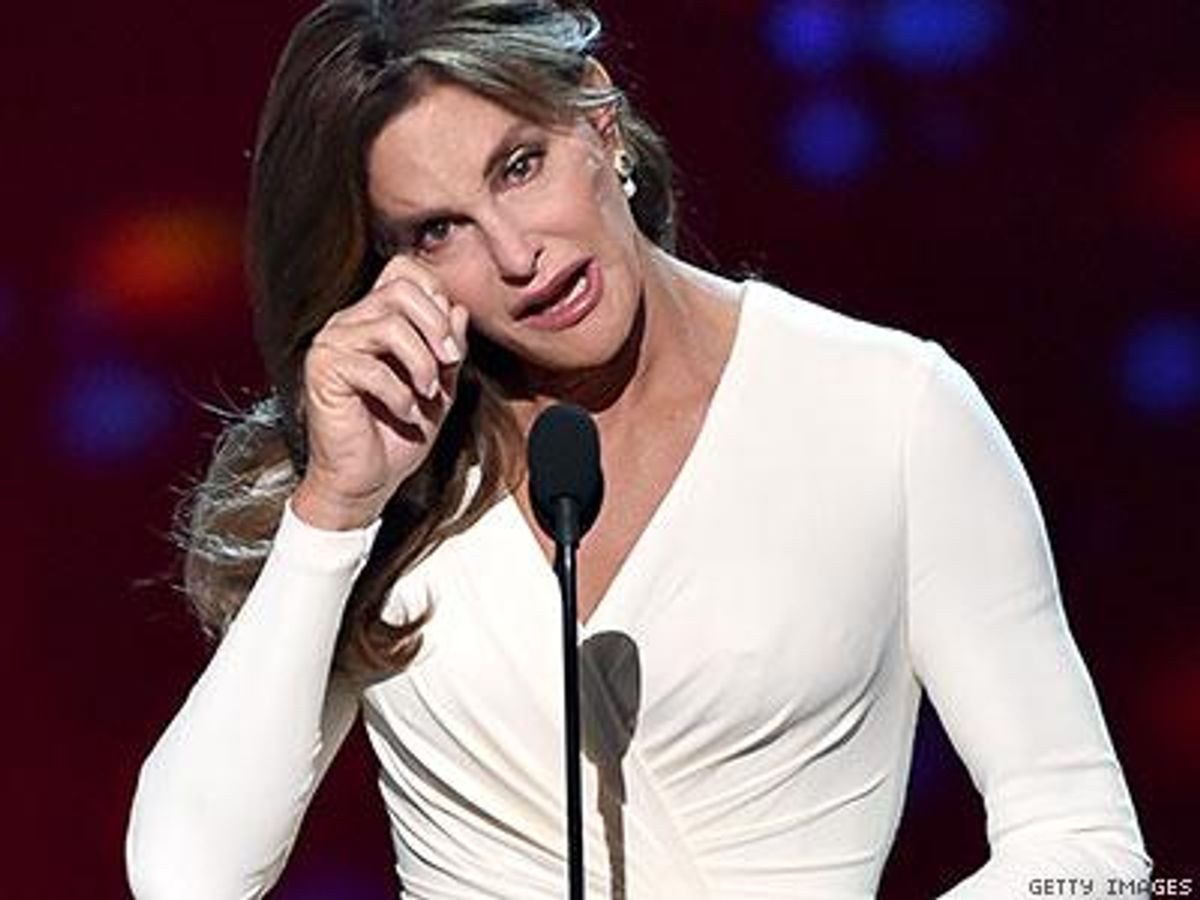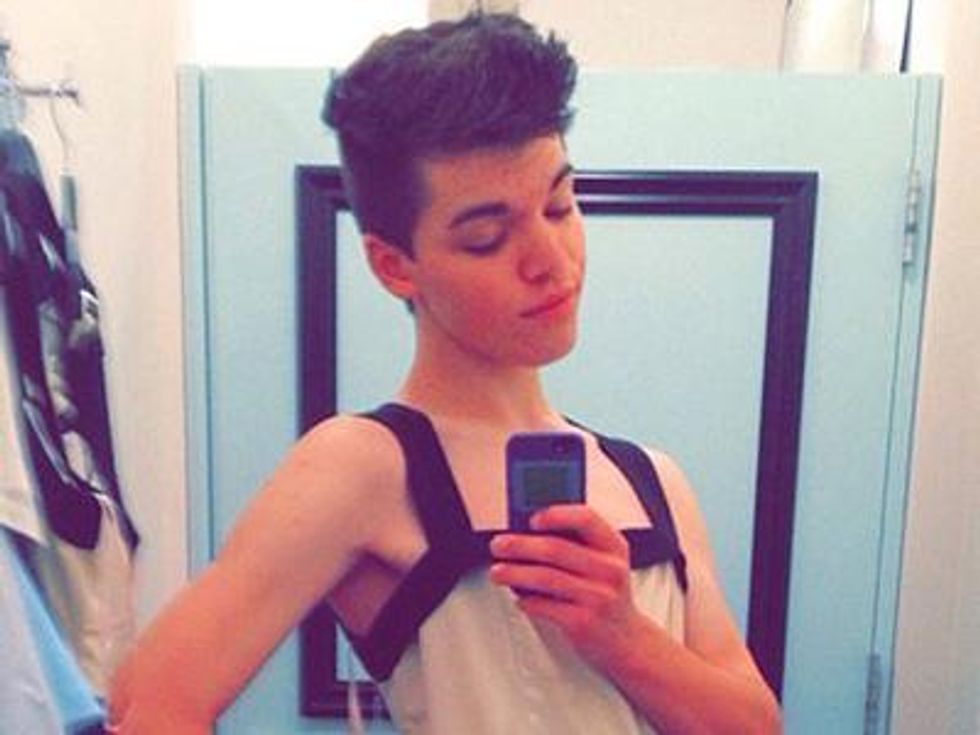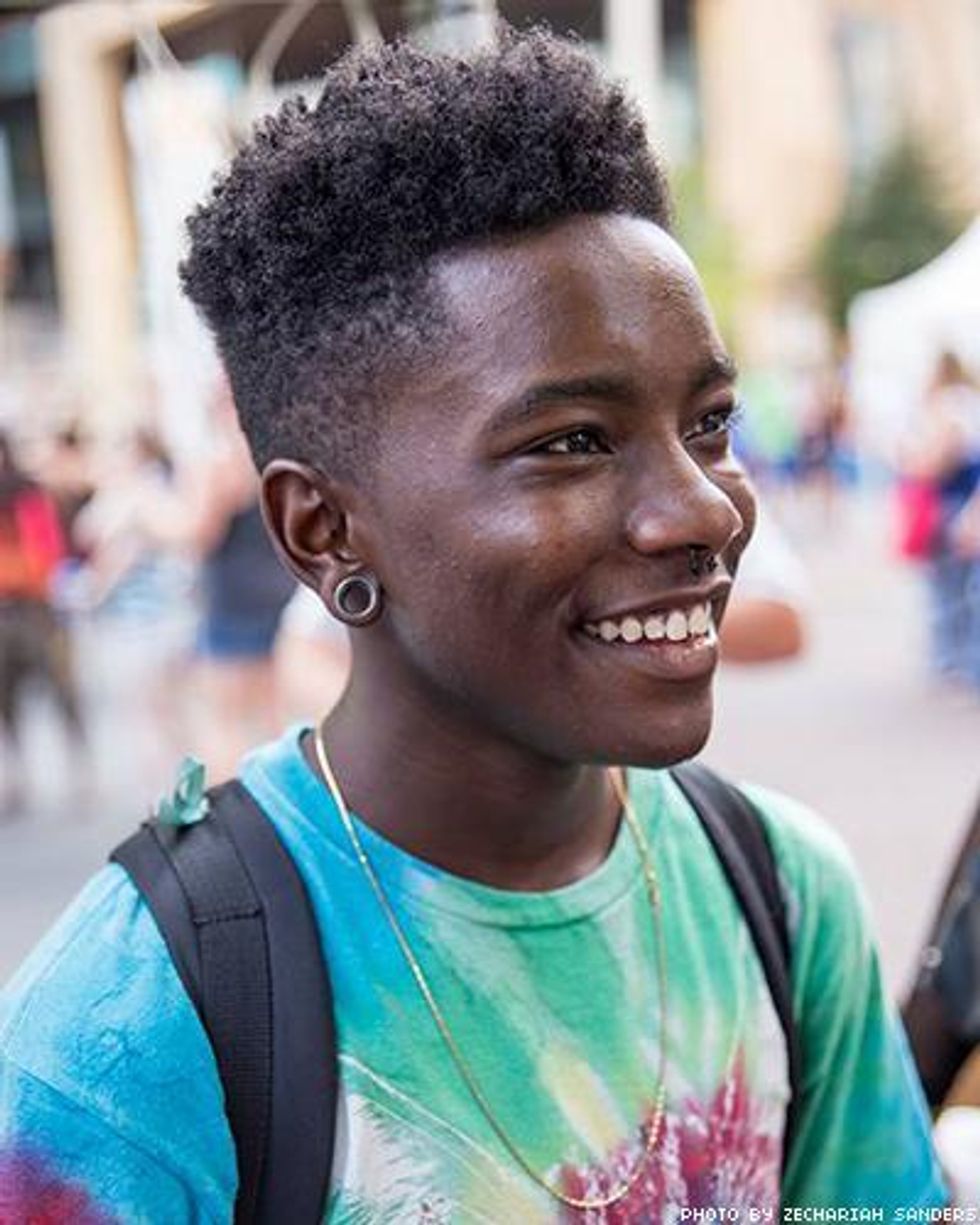While Caitlyn Jenner had plenty of poignant moments during her Wednesday acceptance speech of the ESPY's Arthur Ashe Award for courage, one question she raised has particularly struck a chord with viewers: Would a greater cultural focus on ending anti-trans discrimination have possibly prevented the recent murder of trans girl Mercedes Williamson and the suicide of trans boy Sam Taub?
"Just last month, the body of 17-year-old Mercedes Williamson, a transgender young woman of color [sic] was found in a field in Mississippi [sic] stabbed to death. I also want to tell you about Sam Taub, a 15-year-old transgender young man from Bloomfield, Michigan. In early April, Sam took his own life," Jenner said.
"Now, Sam's story haunts me in particular because his death came just a few days before ABC aired my interview with Diane Sawyer. Every time something like this happens, people wonder, 'Could it have been different, if spotlighting this issue with more attention could have changed the way things happen?' We'll never know."
 Taub, a 15-year-old roller derby skater, took his life April 9 after being bullied for his gender-nonconformity and recently coming out to friends as a trans man. Williamson (pictured left), 17, became the ninth known trans woman murdered in the U.S. this year when the Mississippi teen was fatally stabbed and buried in Rocky Creek, Ala., on May 30. However, Williamson was not a woman of color, as Jenner stated -- but the vast majority of trans women murdered worldwide are.
Taub, a 15-year-old roller derby skater, took his life April 9 after being bullied for his gender-nonconformity and recently coming out to friends as a trans man. Williamson (pictured left), 17, became the ninth known trans woman murdered in the U.S. this year when the Mississippi teen was fatally stabbed and buried in Rocky Creek, Ala., on May 30. However, Williamson was not a woman of color, as Jenner stated -- but the vast majority of trans women murdered worldwide are.

Taub (pictured right), whose roller derby number was #57, was commemorated at derby games nationwide in the week after his death by skaters writing "DoItFor#57" on their arms and wearing the color teal to raise awareness of suicide prevention. Williamson was most emotionally remembered by her roommate Jeanie Miller, who shared her heartbreak with Mississippi's Sun Herald:
"I miss how she flipped her hair. I miss the crooked teeth with that beautiful smile. ... I can smell her. I just keep wanting her to walk through that door. ... I'll never have nobody like her again. That is barely something that crosses people's lives anyway. She is the most beautiful person."
Trans advocates have long decried both suicide and anti-trans murder -- especially the killing of trans women, which occurs every two days worldwide, on average -- as "epidemics." According to the National Center for Transgender Equality and the LGBTQ Task Force, 41 percent of trans people attempt suicide in their lifetime, a rate that stands at nearly ten times the average of their cisgender (nontrans) peers.
Trans women, and especially women of color, are also the group most targeted for murder among all LGBT groups, representing 72 percent of LGBT homicide victims, according to the National Coalition of Anti-Violence. 67 percent of those victims were specifically trans women of color.
In her speech, Jenner highlighted one more striking fact about these trends: their victims are most often young adults. Significantly, BlackLivesMatter.com has asserted that "the average life expectancy of a black trans woman is 35 years."
Many, like Jenner, have wondered what concrete steps need to be taken to alleviate the suicide and murder epidemics. New Orleans LGBT youth of color advocacy group BreakOUT! recently suggested some first steps in a billboard they erected to raise awareness about the murders of trans women like their town's Penny Proud: "Invest in jobs, housing, and education to keep us safe," the board read.
Lack of employment, safe housing, and education have all been correlated with the trans community's poorer socio-economic and health outcomes as compared to cisgender peers. Trans people, on average, face a four times greater likelihood of living in poverty, the Center for American Progress and Movement Advancement Project recently found; trans people of color face up to a six times greater likelihood.
 Another issue commonly plaguing trans youth is social rejection, both by peers and families. The topic gained national attention last year when 17-year-old Ohio trans girl Leelah Alcorn (pictured left) committed suicide. Two hours later her suicide note appeared on her blog, describing years of her trans identity being rejected by her family and her being sent to so-called "conversion therapy" to change her gender identity. Alcorn's letter asked the world to "Fix society" so that no other trans youth had to endure the same anguish she'd felt.
Another issue commonly plaguing trans youth is social rejection, both by peers and families. The topic gained national attention last year when 17-year-old Ohio trans girl Leelah Alcorn (pictured left) committed suicide. Two hours later her suicide note appeared on her blog, describing years of her trans identity being rejected by her family and her being sent to so-called "conversion therapy" to change her gender identity. Alcorn's letter asked the world to "Fix society" so that no other trans youth had to endure the same anguish she'd felt.
 Since her death, media coverage of trans people's suicides has risen, though advocates say there are still many more trans people committing suicide than are recognized nationally. Since Alcorn, thirteen more trans adults and youth have been known to take their lives, including well-known 18-year-old trans activist Blake Brockington (pictured right) in March. Brockington had gained national attention a year earlier for becoming North Carolina's first trans homecoming king elected at a high school, but struggled with feeling unaccepted by family and commenters who attacked him online.
Since her death, media coverage of trans people's suicides has risen, though advocates say there are still many more trans people committing suicide than are recognized nationally. Since Alcorn, thirteen more trans adults and youth have been known to take their lives, including well-known 18-year-old trans activist Blake Brockington (pictured right) in March. Brockington had gained national attention a year earlier for becoming North Carolina's first trans homecoming king elected at a high school, but struggled with feeling unaccepted by family and commenters who attacked him online.
 Even with family support, trans youth often face intense bullying at school, says Kathie Moehlig, the mother of 13-year old trans boy Kyler Prescott (pictured left), whose May 18 suicide in San Diego, Calif., became the most recent death of a trans youth to gain national attention. Moehlig and friends have called for schools to step up their protections of trans youth -- a group that overwhelmingly reports feeling unsafe in school (75 percent) according to the National Center for Transgender Equality.
Even with family support, trans youth often face intense bullying at school, says Kathie Moehlig, the mother of 13-year old trans boy Kyler Prescott (pictured left), whose May 18 suicide in San Diego, Calif., became the most recent death of a trans youth to gain national attention. Moehlig and friends have called for schools to step up their protections of trans youth -- a group that overwhelmingly reports feeling unsafe in school (75 percent) according to the National Center for Transgender Equality.
Jenner, in her Wednesday speech, recognized that she's' barely at the beginning of learning more about these complex, yet preventable, issues. To her audience she recommended one powerful first step: educate yourself.
"I know I'm clear with my responsibility going forward: to tell my story the right way, for me; to keep learning; to do whatever I can to reshape the landscape for how trans issues are viewed, how trans people are treated; and then, more broadly, to promote a very simple idea: accepting people for who they are [and] accepting people's differences," she declared.
If you are a trans or gender-nonconforming person considering suicide, Trans Lifeline can be reached at 877-565-8860. LGBT youth (ages 24 and younger) can reach the Trevor Project Lifeline at 1-866-488-7386. The National Suicide Prevention Lifeline at 1-800-273-8255 can also be reached 24 hours a day by people of all ages and identities.
Watch Jenner's full remarks below.


 Taub, a 15-year-old roller derby skater,
Taub, a 15-year-old roller derby skater, 
 Another issue commonly plaguing trans youth is social rejection, both by peers and families. The topic gained national attention last year when 17-year-old Ohio trans girl
Another issue commonly plaguing trans youth is social rejection, both by peers and families. The topic gained national attention last year when 17-year-old Ohio trans girl  Since her death, media coverage of trans people's suicides has risen, though
Since her death, media coverage of trans people's suicides has risen, though  Even with family support, trans youth often face intense bullying at school, says Kathie Moehlig, the mother of 13-year old trans boy
Even with family support, trans youth often face intense bullying at school, says Kathie Moehlig, the mother of 13-year old trans boy 















































































